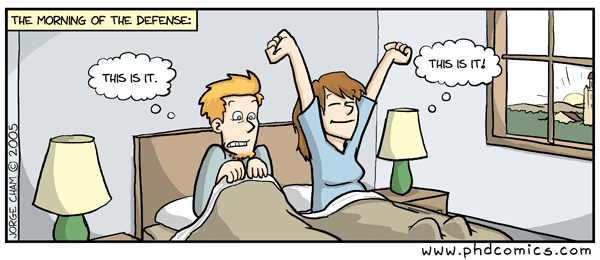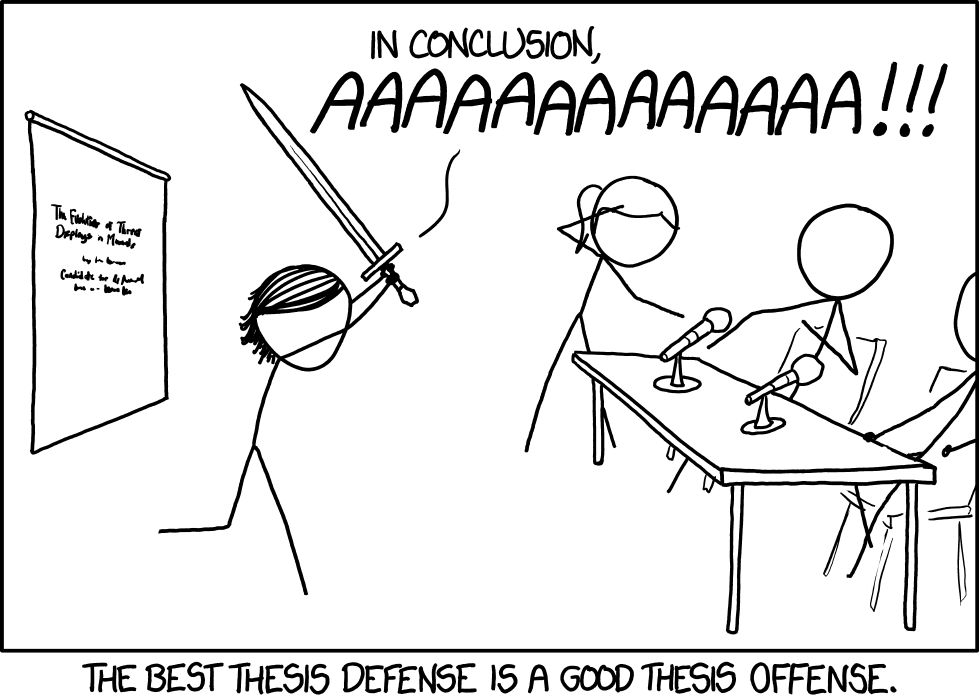The Dissertation Defense Guide
For most doctoral candidates, the dissertation defense is the light at the end of the tunnel, the pot of gold at the end of the rainbow. After years of hard work and sacrifice, a matter of hours stands between you and the title you will hold for the rest of your life. By this point in your doctoral journey, the path ahead should be clear, right? Not so fast.
If you find yourself plagued with questions as your dissertation defense looms on the horizon, rest easy. You’re not alone. While every dissertation defense is unique, this culminating moment in a graduate student’s career is a well-known rite of passage as a candidate becomes a true member of the academy. The stakes are high, and it is natural to be beset with questions as the day draws near.
Dissertation Defense Questions
Many questions about the dissertation defense relate to the structure of the event:
- How long do dissertation defenses usually last?
- Who will be there?
- How do I defend my dissertation?
- What if I fail?
How Long Do Dissertation Defenses Usually Last?

Not terribly long, considering all the ground that gets covered. To be on the safe side, plan to spend about two hours in your dissertation defense.
Though it will vary by departments and fields, two hours is generally ample time for your oral defense–a basic outline of the problem you addressed, the methods you used, and your findings–as well as questions from your committee. Near the end, you will be asked to leave the room and they will talk amongst themselves.
For me, this was the most nerve-racking part of my dissertation defense. My presentation of my dissertation took about twenty minutes, though in reality it went by in a blur. The wait to return to the defense, however, felt like an eternity.

It was surreal to know that my committee was on the other side of the door, deciding my future. It felt like that door would never open. But it did, and hearing “Congratulations, Dr. Watson” for the first time made the wait worthwhile.
My dissertation defense took a little over an hour, which is on the short side; it was efficient and professional. Keep in mind, even though your dissertation defense may be one of the biggest moments of your life, for your committee, it’s another meeting. That’s not to say they aren’t happy for you and your accomplishments, but considering their point of view puts the dissertation defense in perspective and may help ease your mind.
Who Will Be There?

Attendance at a dissertation defense is limited to you and your committee. There are some programs that require a public presentation of dissertations, typically in the presence of members of the department or college, but they are sometimes open to the public as well. In the age of online programs, these presentations are becoming less popular.
The dissertation defense itself happens behind closed doors, and with good reason. This gives your committee an opportunity to discuss your work in detail, and also to pose questions. Your dissertation chair also serves an important role as an advocate for your research. The total committee, including the chair, is usually 3-5 people, making the dissertation defense an intimate affair.
How Do I Defend My Dissertation?

Luckily, defending your dissertation should be the easy part. By the time you reach your dissertation defense, no one understands the inner workings of your research better than you do. Your department may have a specific format for what your oral defense should look like, but if not, be prepared to offer a brief but thorough overview of your process and any revisions you’ve done.
During my dissertation defense, I remember being excited to have an opportunity to talk about my writing. I’d spent a long time alone with my research and my obsessive interest in the intersections of travel, tourism, and literature.
It was a wonderful experience to have a dedicated time and place to talk about my work with a brilliant group of faculty whom I respected deeply. The dissertation defense also gave me a sense of completion, and of a job well done.
What Questions Will I Be Asked?

While there is no set list of questions asked during a dissertation defense, there are a few usual suspects that can help you prepare. You will likely be asked about the genesis of your research question, and how it was shaped by your literature review.
You will also probably be asked about the theoretical underpinnings of your conceptual framework, and the critical scaffolding that brings it all together.
When trying to anticipate questions that may be asked during your dissertation defense, review your notes from previous meetings with your committee and chair.
Were there any suggested changes to your prospectus? Did comments on your literature review lead you to broaden or narrow your focus? Any of these recommendations could be fair game for questions during your dissertation defense.
What If I Fail?

The good news is, by the time a doctoral candidate has reached the point of having their dissertation defense scheduled, failing this final hurdle is incredibly unlikely. Has it happened? Yes. (Don’t google it.)
Though it’s cold comfort, a failed dissertation defense reflects much more poorly on the committee chair and the department than it does on the student. Keep in mind, your committee is deeply invested in your success.
That being said, don’t expect a cakewalk. While there are very few failed dissertations, most don’t pass with flying colors, either. Be prepared for your committee to cite passages or sentences that feel inaccurate, incomplete, or, more likely, insufficiently defended. Expect your committee to request revisions before they put the final rubber stamp on your dissertation.

For me, addressing these revisions was the most maddening part of the process. Even though I had completed the marathon and crossed the finish line, there was one more obstacle between me and the winner’s podium.
Though revisions are typically very minor in the context of the scope of your dissertation, they are essential. Make sure that you get copies of each committee members’ comments so you can review them with your chair.
What Else Should I Know?
Other questions about the dissertation defense relate to practical issues, which are understandable. While our research may be abstract and above mundane concerns, we as people are not. When I was preparing for my dissertation defense, my most anxious questions were firmly grounded in reality:
- What should I wear to my dissertation defense?
- What should I do?
- How else should I prepare?
What Should I Wear?

Ah, the eternal dilemma. While in truth you can wear whatever you want, there are certain considerations to keep in mind when choosing your dissertation defense ensemble.
Professionalism is always appreciated, and many doctoral candidates dress the way they would for a conference or a job interview. Remember, you’ll be entering the room as a student and leaving as a scholarly peer. Dress accordingly.
While academics aren’t exactly known for our sartorial instincts (tweed’s always in style, right?), I love to see personal touches in a candidate’s outfit that commemorates the occasion. From ties featuring chemical formulas to family heirlooms, it’s fine to include something personally meaningful in your outfit. Don’t forget, there will likely be a lot of pictures taken after your successful defense.
What Should I Do?

Sit there, mostly. The dissertation defense is almost equal parts talking and listening. At this point, you know your material inside and out. Talk about your research in a clear and concise way.
Answer your committee’s questions thoroughly, but don’t spend more than a couple minutes addressing each question. Time is limited, and brevity is valued. Show them your expertise by answering questions simply and directly.
Also, listen carefully. This is your committee’s last chance to impress upon you everything they want you to know before they send you off into the world. Having the undivided attention of a roomful of experts focused on your research is a rare occurrence, so make the most of it. You may find great advice and wisdom in their comments, both about your dissertation and for your future as a scholar.
How Else Should I Prepare?
When getting ready for your dissertation defense, self care is incredibly important. It’s a big day, and it’s a good idea to be as relaxed as possible. That may seem unlikely, but you know better than anyone what makes you feel better.

Whether it’s extra sleep or going for a long run or having a nice breakfast, do what you can to get in the proper headspace for your dissertation defense. Showing up on time and in a good mood is sound advice.
I also recommend being prepared for the unexpected, and don’t let a change of plan throw you off balance. The time or place of your defense may change without much notice, or a committee member may be absent. Don’t sweat it. You still have everything you need to proceed.
In the era of COVID19, your department may also have a Zoom contingency and decide to host your dissertation defense online. If this happens, give yourself a little extra time and you should be good to go.
Celebrate
In the midst of all the planning and preparation that goes into researching and writing a dissertation, it is easy to forget that completing one is a huge feat. While you will likely be asked some tough questions during your dissertation defense, don’t be surprised if the overall tone of the meeting is celebratory. Your committee members are excited about your achievement, and you should be too.
Take the time you need to prepare yourself and your materials for your dissertation defense. It’s been a long road, but you’ve got this. Once it’s over, thank your committee members and your chair, and then take some time to relax and celebrate. You’ve earned it.
 Waiting to Get Your Dissertation Accepted?
Waiting to Get Your Dissertation Accepted?







